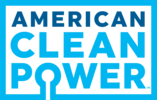News Release from American Clean Power Association (ACP)
Wind Industry Profile of
American wind power sees unprecedented growth entering 2014
Washington, D.C., — The American wind energy industry responded to the extension of the Production Tax Credit in 2013 by starting construction on an historic and unprecedented number of new wind farms, backed by Power Purchase Agreements with electric utilities on a record scale by the close of the year.
“These results show the Production Tax Credit continues to be an effective and efficient policy, driving billions of dollars in private investment into our economy, fostering a new U.S. manufacturing sector, and creating economic benefits for communities across America,” said AWEA CEO Tom Kiernan as the American Wind Energy Association (AWEA) released its U.S. Wind Industry Fourth Quarter 2013 Market Report
The record growth for wind energy at the end of 2013 resulted not only from the extension of the Production Tax Credit (which provides up-front tax relief of 2.3 cents per kilowatt-hour for the first 10 years of a project), but also from investments in technological advancements that have driven down the cost of wind energy by 43 percent in just four years. “Our current growth demonstrates how powerful the tax credit is at incentivizing investment in wind energy,” Kiernan said. “Now it’s up to Congress to ensure that growth continues by extending this highly successful policy.”
Highlights from the U.S. Wind Industry Fourth Quarter 2013 Market Report include:
- At the end of 2013 there were more U.S. wind power megawatts (MW) under construction than ever in history: Over 12,000 MW of new generating capacity was under construction, with a record-breaking 10,900 MW starting construction activity during the fourth quarter. The wind projects under construction could power the equivalent of 3.5 million American homes, or all the households in Iowa, Oklahoma and Kansas.
- A record number of long-term power purchase agreements (PPAs) were signed in 2013. At least 60 PPAs for nearly 8,000 MW were signed by utilities and corporate purchasers, of which 5,200 MW have not yet started construction.
- Some of the states poised for major growth in wind energy in coming years include Texas, Iowa, Kansas, North Dakota, and Michigan.
- There are now over 5,600 MW of turbine orders placed, with major manufacturing facilities active in places such as Colorado, Kansas, Iowa and South Dakota.
- U.S. manufacturing production capacity has ramped up dramatically, and the largest turbine order in history of the U.S. wind industry was placed in the Fourth Quarter.
The start of 2013 for the wind industry was slowed by uncertainty over the Production Tax Credit, which was allowed to expire momentarily on Dec. 31, then extended the next day by Congress and signed back into law on Jan. 2 as part of the fiscal cliff deal.
Historically when the PTC has been allowed to expire, the U.S. industry has faced a 70 to 95 percent drop-off in installations; in 2013, that drop-off amounted to a 92 percent reduction in new wind generating capacity brought online. That dropped from the record 13,131 MW of new capacity installed in 2012, to just 1,084 MW in 2013, a pattern that could repeat unless Congress acts.
But the industry quickly rebounded, signing a record number of Power Purchase Agreements and getting projects under construction in the fourth quarter. Of the 1,084 MW of new wind farms installed in 12 states plus Puerto Rico last year, 1,012 MW were completed in the Fourth Quarter.
The momentum and excitement toward the end of 2013 will carry over into 2014, as factories fill orders for turbines and construction continues at wind farms, but uncertainty over the tax policy again looms and will deter new project development.
“In the absence of long-term policies, the wind industry should not be left out in the cold while Congress decides the way forward on energy,” said Kiernan. “The PTC is a highly successful policy and Congress should act quickly to extend it to maintain a stable business environment, so that wind energy can continue to provide more affordable, clean, homegrown energy.”
President Obama indicated in Tuesday’s State of the Union address that he continues to support the tax incentive when he said, “Let’s continue that progress [on clean energy] with a smarter tax policy… so that we can invest more in fuels of the future… to leave [our children] a safer, more stable world, with new sources of energy.”
The U.S. industry has many reasons for favorable long-term prospects. In addition to the record activity at the end of 2013, wind energy helped keep the lights on and insulate against temporary price spikes during the recent “polar vortex” cold weather snap, demonstrating the value of wind power in a balanced energy portfolio. Recent reports from Oklahoma, the Midwest and Mid-Atlantic regions have confirmed that wind energy lowers costs for electric consumers. And critical to some parts of the country facing continuing drought, wind energy uses no water in its production, as well as releasing no emissions.
As a growing percent of the U.S. power mix today, wind energy already avoids 100 million tons a year of carbon dioxide emissions. That number will rapidly grow as wind energy scales up to 20 percent of the grid and beyond – making the addition of more wind power one of the fastest, cheapest, and largest-scale ways for states to meet the Administration’s new goals for reducing carbon pollution from power plants.
- Source:
- AWEA
- Email:
- windmail@awea.org
- Link:
- www.awea.org/...
